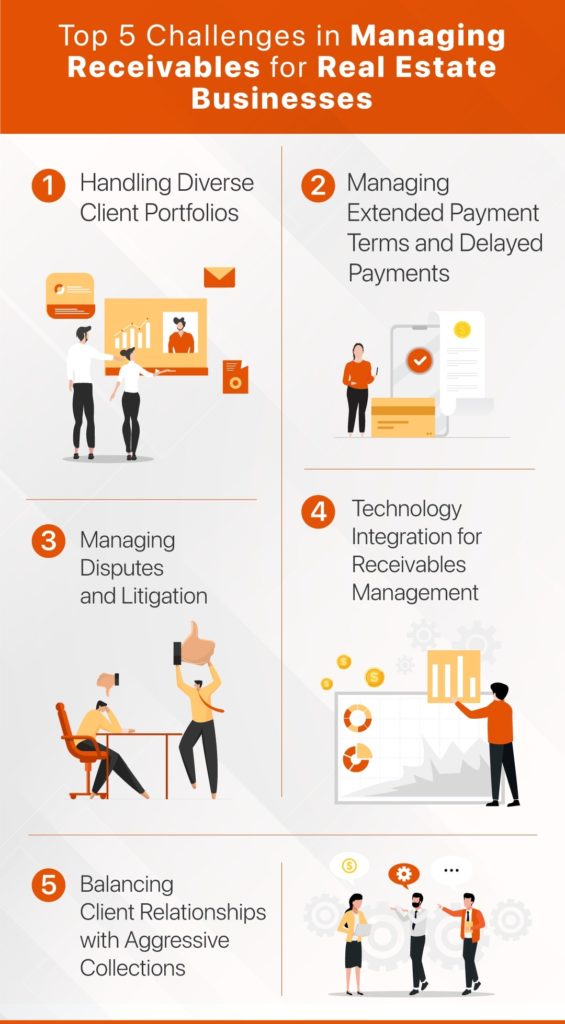 Read time 5 min
Read time 5 minManaging receivables is more than just ensuring payments are collected, it’s about maintaining the financial health and stability of your business.
From handling diverse client portfolios to navigating extended payment terms, real estate professionals face unique challenges that can strain cash flow and complicate operations.
In this blog, we’ll explore the top five challenges in managing receivables for real estate businesses and offer strategies to overcome them, helping you safeguard your business’s financial future.
The Importance of Receivables Management in Real Estate
Effective receivables management is essential to the real estate sector’s ability to sustain business operations and steady cash flow. Real estate transactions often involve large sums of money, extended payment terms, and a diverse client base, each presenting unique challenges that can significantly impact a company’s financial health if not managed properly.
Several factors drive the complexity of receivables in real estate. First, the transaction amounts are typically substantial, making any delay in payments more consequential compared to other industries. According to a study by Demchenko, mismanagement of receivables can lead to severe liquidity issues, affecting a company’s ability to meet its obligations and invest in growth opportunities.
Springbord, with its extensive expertise in real estate financial services, understands these intricacies.
By offering customized receivables management solutions, Springbord helps real estate businesses streamline their cash flow, reduce the risk of defaults, and maintain strong client relationships, ensuring that financial operations run smoothly and efficiently.

Challenge 1: Handling Diverse Client Portfolios
Managing receivables in the real estate industry is complex due to the diverse client base, including residential buyers, commercial tenants, and industrial firms, each with unique payment behaviours and risk profiles. Residential clients, though generally lower risk with smaller transaction amounts, may require frequent payment reminders, while commercial and industrial clients involve larger transactions and extended payment terms that can strain cash flow.
To mitigate these risks, real estate businesses must assess and segment clients based on credit history, payment behaviour, and financial stability, enabling tailored credit policies and collection strategies to effectively manage higher-risk clients and reduce defaults.
Customized Credit Policies
Developing customized credit policies is essential to align with the risk level and financial stability of different client types. For high-risk clients, real estate businesses may require more stringent credit terms, such as shorter payment periods, higher deposit requirements, or the inclusion of personal guarantees. Conversely, for low-risk clients, businesses can offer more flexible terms, such as extended payment periods or lower interest rates on outstanding balances.
Springbord provides real estate companies with specialized receivables management services by utilizing its vast experience in creating customized data solutions. This helps to maintain a healthy cash flow by ensuring that credit policies are effectively aligned with risk assessments.
Challenge 2: Managing Extended Payment Terms and Delayed Payments
Extended payment terms are common in the real estate industry, especially in large commercial and industrial transactions, often leading to significant cash flow strain.
Payment delays can average 60 to 90 days, sometimes extending beyond 120 days, disrupting a company’s ability to cover operational costs, liabilities, and investments. Prolonged cycles also heighten default risks, particularly during economic downturns or client financial difficulties.
Strategies for Minimizing Delays
To minimize the impact of extended payment terms, real estate businesses should consider structuring contracts and payment schedules that incentivize timely payments. Techniques such as offering early payment discounts or imposing late payment penalties can be effective in encouraging clients to adhere to agreed-upon payment schedules. These strategies not only improve cash flow but also reinforce the importance of timely payments to clients.
Springbord’s advanced financial management solutions automate invoicing, reminders, and penalty calculations to reduce administrative burdens and ensure timely receivables collection.
Challenge 3: Managing Disputes and Litigation
Payment disputes are common in real estate, often stemming from disagreements over property conditions, contract terms, or valuation discrepancies. If not effectively managed, these disputes can escalate into costly litigation, delaying payments and straining cash flow.
For instance, disputes over property conditions at handover or contract interpretation can lead to withheld payments and prolonged negotiations.
Proactive Dispute Resolution Techniques
To minimize the likelihood of disputes, real estate businesses should focus on proactive measures, such as drafting clear and detailed contracts, maintaining regular communication with clients, and employing effective negotiation techniques. Clear contracts that outline all terms and conditions, including payment schedules, responsibilities, and dispute resolution mechanisms, can prevent many disputes from arising in the first place.
Springbord’s legal and compliance services assist real estate businesses in effectively managing disputes, offering expertise in contract management and dispute resolution to minimize payment delays and navigate transaction complexities.
Challenge 4: Technology Integration for Receivables Management
The integration of advanced software solutions is becoming increasingly important in the management of receivables for real estate businesses. Specialized accounting and CRM software can streamline the process of tracking receivables, issuing invoices, and monitoring payments. These tools offer real-time visibility into cash flow, enabling businesses to identify potential issues before they escalate.
Data Analytics for Predictive Insights
In addition to automation, data analytics plays a crucial role in modern receivables management. Businesses can predict future payment behaviours, identify high-risk clients, and tailor collection strategies based on historical payment data. Custom dashboards and KPIs can be developed to provide real-time insights into the status of receivables, helping businesses make informed decisions.
Springbord provides advanced technology solutions integrating software and data analytics into receivables management, helping real estate businesses boost efficiency, reduce payment delays, and enhance financial performance.
Challenge 5: Balancing Client Relationships with Aggressive Collections
One of the most delicate aspects of managing receivables is balancing the need for timely collections with the importance of maintaining positive client relationships.
Aggressive collection tactics can damage long-term relationships, leading to client loss and negative impacts on the business’s reputation.
Effective Communication Strategies
To avoid these pitfalls, real estate businesses should focus on clear, assertive communication that emphasizes the importance of adhering to payment terms while maintaining professionalism and respect. This involves setting clear expectations from the outset, regularly communicating with clients about their payment obligations, and addressing any issues promptly and diplomatically.
Third-Party Collection Agencies
In cases where clients consistently fail to meet their payment obligations, engaging a third-party collection agency may become necessary. However, this should be done with caution, ensuring that the agency’s methods align with the business’s values and do not harm client relationships or the company’s reputation.

Springbord’s receivables management services support collections with a focus on professionalism and client relationships, ensuring timely payments without compromising reputation or satisfaction.
Conclusion
Managing receivables in the real estate industry is a multifaceted challenge that requires strategic planning, advanced technology, and careful attention to client relationships.
The financial stability of your company can be greatly impacted by every facet of receivables management, from managing a variety of client portfolios to negotiating longer payment terms and settling disputes. Real estate companies can guarantee consistent cash flow, lower risks, and uphold solid client relationships by proactively addressing these issues.
Springbord offers tailored receivables management solutions for real estate businesses, using data-driven strategies, advanced technology, and expert collections management. Streamline your operations, reduce risks, and secure your financial future with Springbord.
If you have any questions or need assistance, feel free to contact us. Our team is here to help you navigate the complexities of receivables management and ensure your success in the real estate industry.







